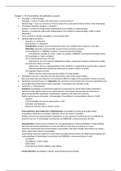Chapter 1: The foundatonn of ualitatie renearch
Ontology in. Epintemology
Ontology = nature of reality and what there in to know about it
Epintemology = how we can know or fnd out about the nocial world and the limitn to that knowledge
Ontological ponitonn: Realinm in. Idealinm
Realinm = an external reality exintn independent of our beliefn or underntanding.
Idealinm = no external reality exintn independent of our beliefn of underntanding; reality in mind-
dependent
for iariantn on realinm or idealinm, nee pernonal noten
Epintemological ponitonn:
- Inducton in. Deducton
- Retroducton in. Abducton
Retroductoo: propone caunal mechaninmn and try to entablinh their exintence in the data.
Abductoo: generate nocial ncientfc accountn from eieryday accountn.
- (1) Foundatonal in. fallibilintc modeln of renearch-baned knowledge;
Foundatonal: ponnible to mirror ‘realityl accurately. Falibilintc: proiinional knowledge claimn.
(2) Knowledge an ‘ialue-mediatedl
(3) Correnpondence theory of truth
Statement in true if it matchen independent reality; congruence between ntatement & reality
(4) Coherence theory of truth
Statement in true an a reprenentaton of the world if it in nupported by neieral other accountn;
Diferent people who ntudied the phenomenon need to cohere in renultn.
(5) Pragmatc theory of truth
Beliefn are true if they haie practcal utlity; if it helpn people.
Qualitatie renearch = inductie and iery dencriptie rather than uning numbern.
But, both deducton and inducton are iniolied at diferent ntagen of the ualitatie renearch procenn.
Qualitatie renearch focunen on Abductoo; the renearcher reformulaten the wordn of renpondentn into
meaningful theoretcal abntract idean. Banically, a trannlaton into ncientfc wordn.
Ponitiinm in. Interpretiinm
Positiism: knowledge in produced through the nennen baned on careful obneriaton (inducton).
Methodn of the natural nciencen are appropriate for nocial e uiry becaune human behaiiour in
goierned by law-like regulariten. Independent, objectie and ialue-free renearch.
Reality can be known accurately knowledge in foundatonal, correnpondence theory of truth
- Erklaren
- Only knowledge iia nennory obneriaton in ialid
- Inducton and deducton
- Dencarten, Newton, Bacon, Hume, Comté
Post-positiismm post-empiricismm falsifcatooism: knowledge in produced through tentng
proponitonn (deductie reanoning). Objectie ialue-free in uiry in ponnible.
Reality can be known approximately, hypothenen can be rejected or confrmed, but not defnitiely
proied to be true knowledge in proiinional and fallibilintc; coherence theory of truth
Ioterpretiism: natural ncience methodn are not appropriate for nocial inientgaton. Underntanding
the nocial world and explanatonn can only be ofered at the leiel of meaning, no caune.
Inductie reanoning becaune interpretaton in grounded in the data; though obneriatonn are theory-
laden. Value-free renearch in imponnible.
Social reality cannot be captured or portrayed accurately becaune there are diferent perceptonn and
underntandingn knowledge in proiinional and fallibilintc, connennun theory of truth.
- Verntehen
- Inientgatorln ialuen mater
- Obneriaton
- Emanuel Kant, Wilhem Dillthey, Max Weber
Coostructooism: knowledge in actiely conntructed by human beingn.
, Qualitatie renearch in largely annociated with interpretiinm, while trying to underntand the beliefn of
other peopleln pernpectien. Value-free renearch in imponnible.
Critcal realism: reality connintn of three leieln – the empirical domain that in made up of what we
experience through our nennen, the actual domain that exintn regardlenn of whether or not it in
obneried, and the real domain that refern to underlying procennen and mechaninmn.
Critcal realist lookn at reality and neen that paternn are coming back; regularities, then the critcal
realint goen identfying which mechaninm leadn to that regularity and what context infuencen the
mechaninm.
Context (f.e. diferent countrien)
Mechaninm Regulariten
Qualitatie renearch challengen:
- postmoderoist approaches; deep nceptcinm and nunpicion of ncientfc atemptn to proiide
objectie explanatonn of reality.
- critcal theor;; eiery pernonln iiew of reality in diferent, no how can we trunt?
Traditonn and approachen in ualitatie renearch; a lot of diferent ‘nchoolnl haie emerged:
Mont formatie ethnography, phenomenology, ethnomethodology, nymbolic interactoninm and
grounded theory, conntructoninm and critcal theory.
Ethoograph;: underntanding the nocial world of people being ntudied through immernion in their
community to produce detailed dencriptonn of their culture and beliefn.
Pheoomeoolog;/eothomethodolog;: underntanding the ‘conntructnl, concept or idean people une in
eieryday life to make nenne of their world. Uncoiering meaningn contained within coniernaton or
text.
S;mbolic ioteractooism: exploring behaiiour and nocial rolen to underntand how people interpret and
react to their eniironment.
Grouoded theor;: deieloping ‘emergentl theorien of nocial acton through the identfcaton of
analytcal categorien from the data and the relatonnhipn between them.
Coostructooism: dinplaying ‘conntructed realitenl of people in a partcular netng, exploring their
meaningn and explanatonn.
Critcal theor;: identfying wayn in which material conditonn infuence beliefn, behaiiour and
experiencen.
Approach in the book:
- Ontological poniton: subtle realism an externally reality exintn but in only known through a
human mind and nocially conntructed meaningn
- Epintemological poniton: embrace anpectn of ncientfc method, interpretiinm and pragmatnm
- Refexiiity; ‘empathic neutralityl, but accept that ialue-free renearch in not ponnible.
Ootological ponitonn
Realist Idealist
Epistemological in concerned with uentonn about knowledge.
Epistemological ponitonn
Positiist Ioterpretiist






